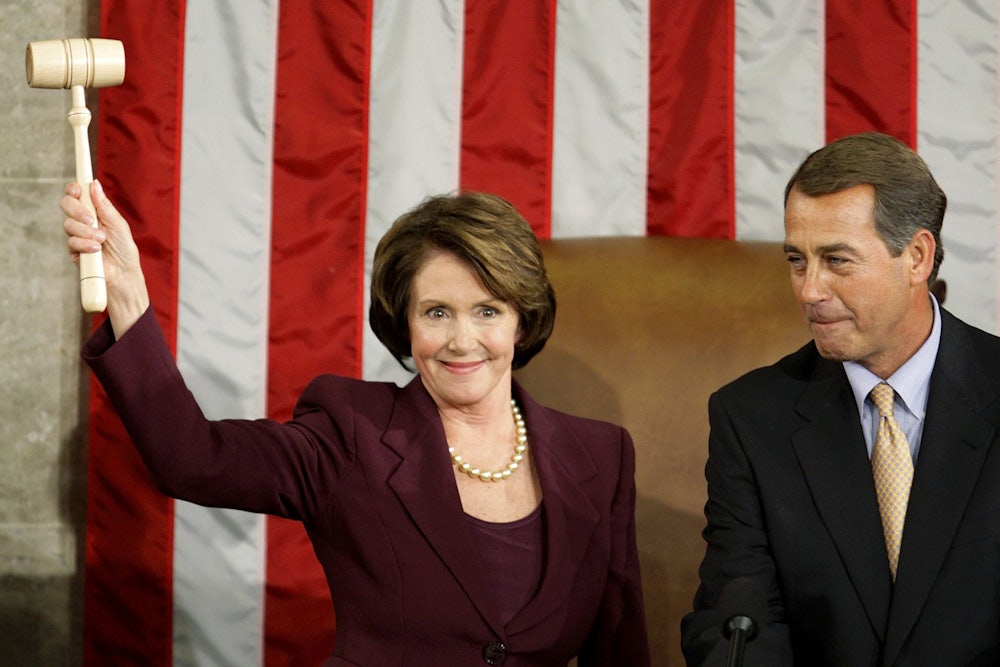Jon Ossoff’s disappointing loss in Tuesday’s special election in Georgia has triggered rebellious feelings within the Democratic rank-and-file, as some call for House Minority Leader Nancy Pelosi to step aside. “I think you’d have to be an idiot to think we could win the House with Pelosi at the top,” Filemon Vela, a congressman from Texas, told Politico. “Nancy Pelosi is not the only reason that Ossoff lost. But she certainly is one of the reasons.” Vela’s impassioned comments are all the more startling because he supported Pelosi in the leadership race in November, when Congressman Tim Ryan of Ohio ran as the populist alternative. While Pelosi won decisively, 134 to 63, Ryan did well enough to prove that congressional Democrats were, like the broader party, deeply divided.
If the race were held again today, Pelosi likely would face a much tougher fight—though as Politico reports, “There is no challenge to Pelosi’s leadership, and none is going to happen at this point, said numerous Democrats.” Pelosi, who is 77 and has led House Democrats since 2003, isn’t going anywhere for awhile—and that’s what worries restless Democrats.
The case against Pelosi is by no means clear cut. Her detractors note that Republican attack ads in the Georgia race gave her prominence, apparently evidence that her unpopularity is a drag on the party. “The fact that Republicans spent millions of dollars on TV ads tying Democratic hopeful Jon Ossoff to Pelosi — and the brand of progressive policies she represents — shows that she will once again be an issue for Democratic challengers in the very districts that the party needs to win to make her speaker again,” Politico notes. Yet as Dartmouth political scientist Brendan Nyhan tweeted:
Hot take - most Americans don't vote for Congress based on who is in House leadership! And Ryan's favorability numbers are as bad as Pelosi
— Brendan Nyhan (@BrendanNyhan) June 21, 2017
The ads that featured Pelosi were aimed at energizing highly partisan Republicans, the type of people who would know and hate any Democratic leader. Pelosi is a villain in these ads almost by default, since more prominent party leaders—Barack Obama and Hillary Clinton—have stepped aside, and thus lack sufficient scariness as bogeymen. Moreover, getting rid of Pelosi just because Republicans hate her would be a singularly craven move for Democrats—and would probably be ineffective to boot, in this regard. Her successor would become the GOP’s new top enemy.
The ideological critique of Pelosi is equally confused. To Republicans, she’s the archetypical “San Fransisco Democrat,” committed to unrestrained liberalism and out of touch with heartland values. Yet to Pelosi’s left-wing critics, she’s utterly without principles and cares only about holding the reins. “The Democratic House leadership is dedicated to retaining power for themselves and nothing else,” argues Matt Stoller, a fellow at the New America Foundation. “Nancy Pelosi is utterly incoherent. She’s not a leader, she’s in charge of making sure no other leaders emerge.”
Both these critiques miss the central fact about Pelosi: She’s been an extraordinarily effective parliamentarian. The daughter of a former congressman and mayor of Baltimore, she was born into the machine politics of the Democratic Party and has the gift of a ward boss who knows how to trade favors and cut backroom deals in order to hold a coalition together. She is also perhaps the most talented fundraiser in American politics, having brought in more than half a billion dollars to Democratic coffers since taking over the leadership in 2003. She inherited a minority party that had been in retreat for more than a decade, and brought it back to majority status in 2006.
Unlike the Republican speakers who preceded her (Dennis Hastert) and succeeded her (John Boehner, Paul Ryan), Pelosi held her caucus together during their minority (under President George W. Bush) and delivered major legislative victories during their majority (especially in President Barack Obama’s first two years). A 2009 profile in Time surveyed her accomplishments: “Pelosi holds the highest post ever attained by any woman in U.S. history, and stands second in line of succession to the presidency. She has consolidated more power than any other Speaker in modern history, scholars of the office believe. In the first year of the Obama presidency, she has used that power — and an 81-seat Democratic majority, the largest either party has enjoyed in the House in 14 years—to pass every item on his agenda: health care, energy, regulatory reform, education, pay equity.”
The determination and strong-arming Pelosi showed in pushing through this ambitious agenda might also point to why it’s time for her to go. Her iron grip on House Democratic leadership is preventing a new generation of leaders from rising, which the party desperately needs to attract new voters. Her use of the Democratic Congressional Campaign Committee is a case in point. As Tom Dickinson notes in Rolling Stone, “The committee has functioned as the political machine of Nancy Pelosi, leader of House Democrats since 2003, who is the DCCC’s prodigious chief fundraiser and has hand-picked its chairman. On Pelosi’s watch, the committee has caught flak from allies for being slow to adapt to the digital and demographic revolutions in politics, creating a disconnect with the emerging electorate.”
When Pelosi herself first rose to national prominence in the early 2000s, she was the upstart politician rebelling against a sclerotic leadership. As Karen Tumulty wrote in a 2009 profile for Time, when Pelosi argued for new strategies to win back the House she “could feel the dismissiveness from the House Democratic leadership, which hadn’t added a new face to its top echelon in nearly a decade.” The Democrats are once again in a situation where the party elite needs new blood. But if it’s time for fresh leadership, Democrats would do well to remember and celebrate Pelosi’s genuine achievements as one of the most substantive legislators in modern American politics. In fact, they should be so lucky as to find the next Nancy Pelosi.
